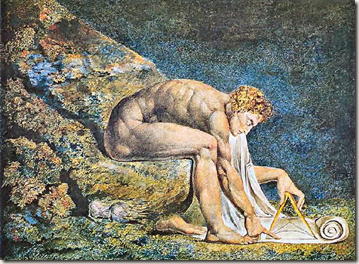Whence the Wobble
By John Taylor; 2010 Oct 08, Mashiyyat 12, 167 BE
In the century after John Amos Comenius' death, a divorce took place in Europe between religion and politics. Decades of bloody sectarian war showed how deadly interference of religion and politics with one another could be. As an educator, spiritual leader and peace negotiator, Comenius strove all his life to prevent such a breakup, not only with politics but also of religion and science. He enthusiastically propounded Francis Bacon's arguments that the new science is sanctioned and inspired by the Bible. Had Comenius greater influence in France and the English speaking world, the 18th Century Enlightenment would have included religion, which as we have seen he held up as one of the three paths of the human spirit to enlightenment.
In enduring ways, this tragic parting of the ways stunted human potential. The worldview of educated people was permanently put out of whack. By and large, religion learned to exclude itself from the public forum. Increasingly narrow minded religious leaders gloried in triumphalism, exclusivism and vigorously opposed liberal principles. They chose disputation and sectarian rivalry over responsibility to the good of all. Thus secularism was born; anti-theists openly hacked at the pillars of belief. The wealthy and educated few parted ways from the poor majority of humanity, most of whom were and still remain heavily invested in God and religion.
At the same time, science remained to some extent excluded from public policy as well. Research and experimentation was restricted to private pursuits, the professions and, increasingly, the university. Even the government supported laboratories initiated by Napoleon tended to engage largely in research and development with military applications. Scientists themselves had and still have no direct say in public policy; the failure of governments to respond to global warming makes this glaringly clear.
Our True Center of Gravity
As mentioned, the preponderating majority of the population on a global level believe in God, in spite of being weighed down by extreme poverty -- or perhaps because of it. That was the majority opinion in the 17th Century, and it remains so today. As a result, when faith was removed from the public forum, most of humankind was marginalized. It opened up a gap in our collective worldview. Liberalism, belief in the prime importance of freedom, became the exclusive domain of a small, secular elite, in spite of the glaring fact that the very idea of liberation comes from the Bible. The exodus of Hebrew slaves initiated by Moses, and the brash declaration of a social outcast that "the truth shall set you free," are difficult to ignore.
The result? Without general agreement upon first principles, it was difficult to summon up concerted, consistent action in the interest of all. Omitting the concerns of faith from the concept of freedom introduced an eccentric bias not only to the liberal agenda but to its proudest product, democratic government. Crazily enough, by rejecting the conviction of the poor majority that God is relevant, liberals were doomed from then on to be inherently anti-democratic. Their popular support thus weakened, liberals were overly influenced by a cynical elite, whose only faith is in greed or absolute power. These secret partisans lobbied to set the agenda, applying ever more sophisticated tactics of divide and rule.
Thus was born in partial liberalism a predatory breed of democracy that gave a voice only to some, that allowed almost unlimited freedoms for a few while condoning gross inequality for most. On a world level, "democratic" governments tend to be the most vehement and violent opponents of freedom for the poor South. Immanuel Kant pointed out that there is a contradiction at the heart of majoritarian democracy,
"Of the three forms of the state, that of democracy is, properly speaking, necessarily a despotism, because it establishes an executive power in which "all" decide for or even against one who does not agree; that is, "all," who are not quite all, decide, and this is a contradiction of the general will with itself and with freedom." (Kant, Sketch of Perpetual Peace, First Definitive Article; The Civil Constitution of Every State Should Be Republican")
Even representative democracy encourages the general will to clash with itself. The inevitability of contradiction on a certain level is why questions of faith cannot be ignored or suppressed, for only in the sacred are opposites reconciled. Plato reasoned the argument like this: all good governance is ultimately the outcome of the moderating effect of many friendships actively changing society. Religious ceremonies promote varied and mixed relationships.
"A legislator should avoid the slightest interference with (sacred traditions); he should assign every district its patron god, or spirit, or hero, as the case may be ... His purpose in this will be that the convocations of the various sections may provide for the satisfaction of their various needs, and that the festivities may give occasion for mutual friendliness, familiarity and acquaintance." (Plato, Laws, 738d, Collected Writings, p. 1323)
Relationships formed in the rarefied atmosphere of reverent spirituality tend to involve the fortunes of the many with the few. They temper the diversity and truculence of human opinion -- for the same reason that we all adapt what we have to say to the person we are speaking to. Nobody speaks in the same tone to a boss as to an underling, to a mother as to a son or lover. Thus a vital religious faith is, in Plato's view, a prerequisite for democratic ways of thinking.
"There is indeed no such boon for a society as this familiar knowledge of citizen by citizen. For where men have no light on each other's characters, but are dark on the subject, no one will ever reach the rank or station that he deserves, or get the justice which is his proper due. Hence in every society it should always be the endeavor of every citizen, before anything else, to prove himself to all his neighbors no counterfeit, but a man of sterling sincerity, and not to be imposed upon by any counterfeiting by others." (Laws, 738e, pp. 1323-1324)
This essential duty of a citizen to other citizens can only be aided by broad recognition of an unknowable, loving God Who is willing to show us the way forward. This general recognition smoothes out contradictions and allows society to roll straight forward towards universally acceptable goals. Next time we will discuss the public institution, the Consistory of Holiness, that Comenius designed for furthering this purpose.



No comments:
Post a Comment